Equitable Partnerships for Sustainable Urban Futures for Young People
The UN celebrates World Cities Day annually on 31 October at the end of Urban October to mark the significance of global urbanisation for the international community and to further cooperation across nations for achieving sustainable urban development. It was established on 27th December 2013 with the enduring theme of Better City, Better Life.
Urban October and especially World Cities Day is an opportunity for everyone to be part of the conversation about the challenges and opportunities created by the fast rate of change in our cities and towns and to cultivate multi-lateral cooperation towards the New Urban Agenda led by UN Habitat. This year on 31 October 2023, the Global Observance of World Cities Day will be under the theme Financing sustainable urban future for all.
On the occasion of World Cities Day, the University of Melbourne Centre for Cities’ Evidence to Action project team set up by Swiss philanthropic organisation Fondation Botnar, presents a discussion exploring the importance of building equitable partnerships to cultivate sustainable urban futures. The Evidence to Action project is about establishing systematic evidence building processes using the Evidence to Action framework. 'Equitable partnerships' is a domain of change within the Evidence to Action Framework that was first explored during the Evidence to Action Dialogue Series hosted by the project team in 2021. This webinar continues the discussion forward.
Critical for promoting sustainable urban futures is evidence-based decision-making that can inform programmatic and policy action. This also requires addressing the top-down power structures that have existed in the development sector for decades and strengthening of capacity at the grassroots to produce knowledge on ‘what works’ and ‘what does not work’ in their diverse contexts. The purpose of the Evidence to Action project is to aid the development of innovative approaches centred on equitable partnerships exploring the realisation of SDG 17 of “strengthening the means of implementation and revitalize the Global Partnership for Sustainable Development”. Through this discussion, the Evidence to Action team brings together multi-sectoral actors to reflect on evidence-based strategies to promote equitable partnerships from local to global.
This World Cities Day 2023 event includes speakers from various projects and programs supported by Fondation Botnar including their local implementing partners, researchers, policy experts, and other practitioners from across the world. The discussion explores the following themes:
- Significance of political will of local government actors in fostering equitable partnerships with multi-stakeholders for good development within a city.
- Value/importance of young people and their perspectives in co-designing local initiatives and contributing to evidence-building processes.
- Value of building alliance and fostering multi-sectoral cooperation to promote knowledge exchange and collaboration for policy action.
- Role of technology in empowering youth to co-produce knowledge that fuels advocacy at the local & national level.
- Role of UN and other multi-laterals in supporting young people’s right to the city and strengthening their influence in local and global policy.
- Weight of including young people’s voices and their aspirations in framing and shaping policies local to global.
- Reflecting on consortium building and the realities of addressing power relations across different levels of operations within multi-country programs.
- Significance of bridging the gap between practice and research to activate local organisations as equitable partners in shaping cities.
________________________________
Moderated By
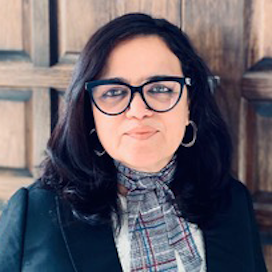
Joyati Das
Joyati is a senior international development professional, thought leader and human rights advocate with a focus on children and youth rights in diverse urban contexts. She brings over 25 years of experience in international development, humanitarian response, research and advocacy initiatives with large non-governmental organisations. She was the Senior Director leading the Centre for Urban Programs at World Vision International for over 10 years and the elected representative of the global children and youth constituent group at the Habitat III conference led by the UN where the New Urban Agenda was launched. Joyati currently leads the Evidence to Action Framework Project supported by Fondation Botnar at the University of Melbourne Centre for Cities as an Enterprise Principle Fellow.
________________________________
Speakers
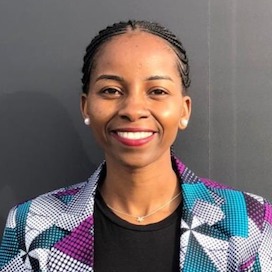
Esther Muiruri
Esther is the founder of the Gold Ribbon Initiative, a youth-led non-profit committed to advocating for the well-being of children living with cancer in Kenya. She is a committed professional in the field of Disaster Risk Management and Environmental Planning and Management with an MSc in Intelligence Security and Disaster Management. She has extensive experience implementing Disaster Risk Reduction and Humanitarian Response programs and stakeholder policy engagement in Kenya and globally. She has contributed to the policy process of the SDGs and other UN frameworks. Esther is a Local2030 Coalition steering committee member for SDG localization co-chaired by the UN-Habitat and UNDP.
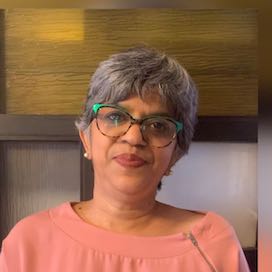
Kalpana Viswanath
Kalpana is the co-founder and CEO of Safetipin, a social enterprise that uses technology and data to advocate for safe urban spaces for women in more than 25 cities in India and globally. She led the Safe Delhi program for Jagori in close collaboration with the Delhi government to help build programs to address women’s safety. Kalpana has also been a consultant for UN Women and UN-Habitat on issues of gender and urban safety and she is a member of the Advisory Group on Gender Issues (AGGI) at UN-Habitat, a Board member of SLOCAT (a global network on sustainable mobility), the International Centre for the Prevention of Crime (ICPC), and the Executive Committee Chair for Jagori, a leading Indian feminist non-profit organisation.

Juan Carlos Muñoz-Mora
Juan Carlos is a professor at the School of Finance, Economics and Government of the Universidad EAFIT and associate researcher at the Institute of Development Studies (IDS). Economist from the University of Antioquia, with a Master's degree in Economics from the Universidad de los Andes and Ph.D. in Economics from the Free University of Brussels with a European Doctorate recognition from Pompeu Fabra University. Juan Carlos has worked as a consultant for the World Bank, USAID, IDB and UNICEF on issues of rural development, impact assessment in the rural sector and technological transformation in the rural sector of developing countries, among others.
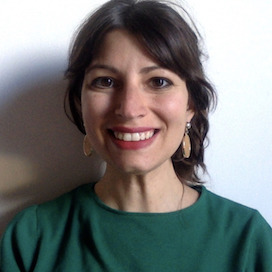
Stephanie Butcher
Stephanie is a Lecturer in the Department of Geography at Sheffield University, and Director of the BA Global Sustainable Development Programme. Research interests focus on global development and social justice- examining the production of inequalities within urban planning and practice, and the collective practices through which peripheralized groups mobilise against uneven development. She is the PI on the research project: Co-Constructing Neighborhoods for Diverse Young People: Civic Media Technologies for Equitable Urban Governance.
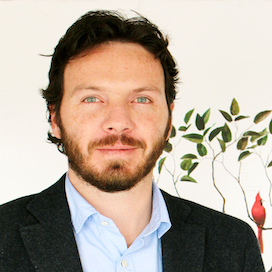
Daniel Uribe
Daniel is the Executive Director of Fundación Corona, a family foundation focused on social development in Colombia for the past 56 years. In this role he has promoted systemic approaches to addressing social problems and promoted collective impact around the foundation's prioritized agendas: Citizen Engagement and Education for Employment. He has worked as an Associate at Endeavor Colombia, where he designed and executed strategic plans for the growth of High Impact Entrepreneurs. He is a board member of the Association of Family and Business Foundations-AFE, Así Vamos en Salud, Corporación National Advisory Board Colombia-NAB Inversión de Impacto y de Transparencia por Colombia. In recent years he has led the agenda around Impact Investing and financial innovation in Colombia.

Kathryn Scurfield
Kathryn is an Associate Director at Ecorys UK. She currently acts as the Programme Director and Monitoring, Evaluation and Learning (MEL) Lead for the Healthy Cities for Adolescents Phase-II programme. Kathryn has over 14 years of experience in MEL and implementing projects across a range of social policy areas throughout East Africa and Southeast Asia. She has worked with a variety of stakeholders including the UK Foreign Commonwealth & Development Office (FCDO), the Independent Commission for Aid Impact (ICAI), the European Commission, USAID, Global Affairs Canada, various social enterprises philanthropic organisations, and NGOs.
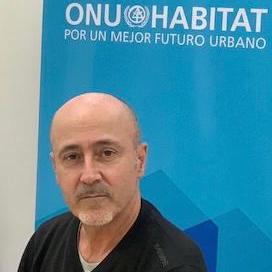
Roi Chiti
Roi is an architect and urban planner with an MA in “Development and International Aid” and an MSc in “Land Use and Water Management”. He has been working with UN-Habitat since 2009 where he coordinated the substantive programme of three editions of the World Urban Forum (WUF) and was seconded to the Habitat III Secretariat, to lead the UN drafting team of the New Urban Agenda and coordinate all the relevant knowledge and policy dimensions feeding its final formulation. He also coordinated the main Global Advocacy Platforms at UN-Habitat from 2018-2019. Since 2020 he has been the Coordinator of the Andean Region and UN Habitat representative for Colombia, Ecuador, Bolivia, Peru, and Venezuela.
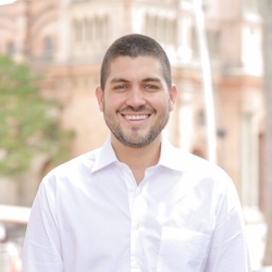
Mayor Óscar Escobar
Óscar is the Mayor of Palmira, a city of 354,285 situated in the Valle del Cauca in Colombia. After a successful campaign under the slogan There is another way, he became the youngest-ever mayor of his hometown. His priorities are to modernise the city, improve the infrastructure, and prevent violence. Óscar Escobar studied economics at the Universidad Icesi and holds a Master’s degree in public policy from the Universidad de los Andes. Prior to becoming Mayor of Palmira, he worked at the National Planning Department, and as an economic advisor to Senator Claudia López. In 2016, he returned to his home region to work with the Mayor of Cali, Maurice Armitage, as director of Municipal Planning and Information and Communication Technologies.
This World Cities Day event is presented by the Melbourne Centre for Cities at the University of Melbourne, supported by Fondation Botnar.